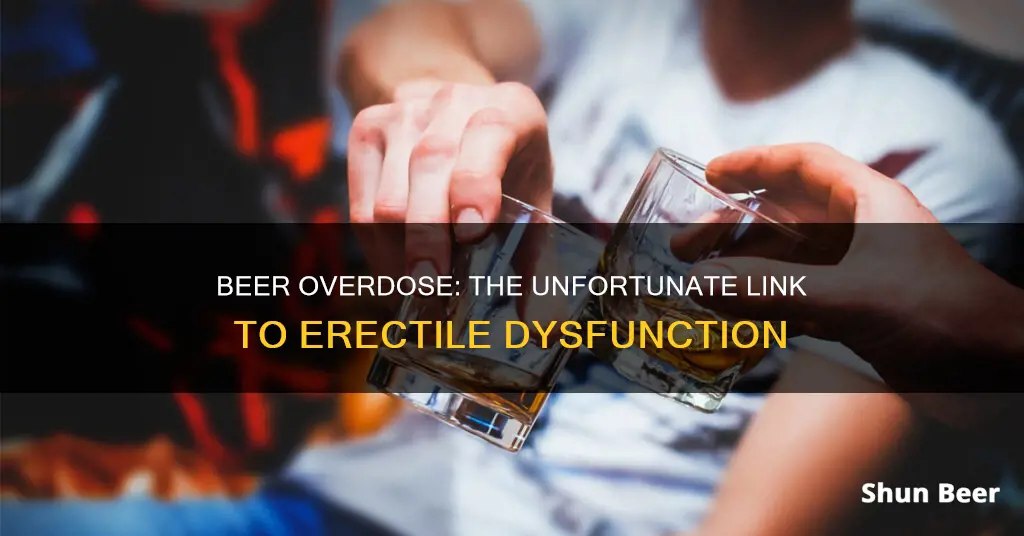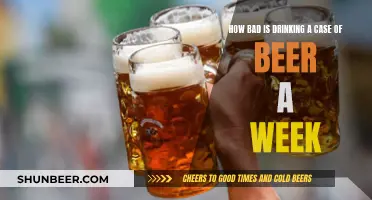
Drinking too much beer can cause erectile dysfunction (ED). Alcohol acts as a depressant, slowing down the signals between the brain and body, including the penis. This can lead to ED when a man has been drinking heavily. Alcohol is also a diuretic, which means it increases urination and can lead to dehydration, reducing blood flow to the penis and making it more difficult to get an erection. Chronic heavy drinking can cause long-term damage to blood vessels, nerves, and cardiovascular health, all of which are risk factors for ED. While moderate alcohol consumption may not negatively impact sexual function, excessive drinking can lead to temporary and long-term ED.
| Characteristics | Values |
|---|---|
| Alcohol's effect on ED | Alcohol is a depressant that slows down the signals between the brain and the penis, causing ED. |
| Alcohol is a diuretic, causing dehydration and reduced blood flow to the penis, which may result in ED. | |
| Alcohol increases the body's level of angiotensin, a hormone associated with ED. | |
| Alcohol lowers sexual sensitivity by inhibiting parts of the central nervous system responsible for sexual arousal and orgasm. | |
| Alcohol may cause a drop in testosterone levels, which can limit nitric oxide production and affect erections. | |
| Long-term alcohol abuse can cause nerve damage and blood vessel damage, impacting the ability to get an erection. | |
| Alcohol abuse can lead to cardiovascular disease, a risk factor for ED. | |
| Alcohol withdrawal syndrome can also cause high blood pressure, which may interfere with getting an erection. | |
| Alcohol consumption and ED risk | Mild to moderate alcohol consumption may not negatively impact ED risk and could have a positive effect. |
| Excessive alcohol consumption increases the risk of ED. | |
| Chronic heavy drinking is a contributing factor to long-term ED. | |
| Treatment/Prevention | Abstaining from alcohol or reducing alcohol intake can help improve ED symptoms. |
| Staying hydrated before and during drinking alcohol may help prevent alcohol-related ED. | |
| Medications like PDE-5 inhibitors can be used to treat ED, but alcohol consumption is not recommended when taking these drugs. |
What You'll Learn

Alcohol is a depressant
Alcohol affects the central nervous system (CNS) by disrupting the neurotransmitters in your brain that are responsible for transmitting information. This can affect your behaviours, thoughts, and feelings. It acts on an inhibitory neurotransmitter known as gamma-aminobutyric acid (GABA), which makes nerve cells less able to send, receive, or create signals. In other words, it reduces activity in the brain.
The immediate effects of drinking alcohol can help you feel more relaxed, more confident, and less inhibited. However, as these short-term effects wear off, other effects begin to take hold, including feelings of anger, anxiety, and depression.
Alcohol can also induce temporary erectile dysfunction (ED) and increase your risk of developing long-term ED. Excessive alcohol consumption affects male sexual function by slowing down the signals between the brain and the penis, sometimes resulting in ED when a man drinks too much. Alcohol is also a diuretic, which means it causes a person to urinate more frequently than usual and can result in dehydration. Dehydration decreases the volume of blood in the body, also decreasing blood flow to the penis and making it more difficult to get an erection.
Post-C-Section: Beer Drinking, What You Need to Know
You may want to see also

Alcohol is a diuretic
This causes a decrease in total body water, including the water in your blood. Less water in your bloodstream reduces your blood pressure, and erections are produced by an increase in blood flow to the penis, so a decrease in blood pressure may affect your ability to achieve or maintain an erection.
Dehydration caused by alcohol can also lead to increased levels of the hormone angiotensin, which is associated with erectile dysfunction. Angiotensin can limit blood flow to the penis by narrowing blood vessels.
In addition, alcohol consumption can lead to a drop in testosterone levels, which can further contribute to erectile dysfunction. Testosterone is key to relaxing the blood vessels in your penis.
Tech Football and Beer: What's Allowed?
You may want to see also

Alcohol lowers testosterone levels
Drinking alcohol in large amounts or frequently can cause testosterone levels to drop. Testosterone is the primary male sex hormone, giving men their masculine features and playing a critical role in muscle and bone growth, as well as sperm development. When testosterone levels drop, it can lead to problems such as erectile dysfunction (ED).
How Alcohol Affects Testosterone Production
There are three glands needed for the production of testosterone in men: the hypothalamus, anterior pituitary gland, and the testes. Alcohol can disrupt testosterone production by interfering with all three glands.
Long-term Effects of Alcohol on Testosterone
Heavy drinkers are more likely to experience erectile dysfunction and low testosterone levels. It is thought that chronic alcohol misuse damages the Leydig cells in the testes, which are responsible for testosterone production. Alcohol may also interfere with the release of luteinizing hormone (LH) and follicle-stimulating hormone (FSH).
Short-term Effects of Alcohol on Testosterone
Acute alcohol consumption can cause short-term impairments in testosterone release by negatively affecting the hypothalamus and pituitary gland. Research has found that testosterone levels can drop in as little as 30 minutes after alcohol consumption.
Reversing the Effects of Alcohol on Testosterone
Quitting alcohol or reducing alcohol intake to a safe level may help reverse some of the damage caused by chronic drinking. However, depending on how much and how long an individual has been drinking, recovery can take months or years, and some damage may be permanent.
Plate Beer Wort Chiller: How Does It Work?
You may want to see also

Alcohol damages blood vessels
Drinking too much alcohol can have harmful effects on the body, including the heart and veins. Both binge drinking and long-term drinking can severely affect the heart. Alcohol can cause cardiomyopathy, a condition where the muscles in the heart stretch and droop, impacting its ability to pump blood throughout the body. This interruption in blood flow can result in damage to various organs.
Alcohol and Blood Vessels
Alcohol can affect how the veins function, which, in turn, impacts the rest of the circulatory system. One of the most common alcohol effects on blood vessels is hypertension or high blood pressure. Drinking too much alcohol can release hormones and/or affect the muscles in the veins, causing them to constrict. When blood vessels become narrower, the heart needs to work harder to move blood around the body, leading to increased blood pressure.
High blood pressure, if left untreated, can significantly increase the risk of stroke, heart disease, vascular dementia, and chronic kidney disease. It can also cause smaller vessels to become entirely plugged up, starving skin cells of oxygen, resulting in red and blotchy skin.
Alcohol as a Vasodilator and Vasoconstrictor
There is some confusion about how alcohol affects the veins. Does alcohol constrict or expand the blood vessels? The answer depends on how much alcohol is consumed. At initial intoxication levels, alcohol works as a vasodilator, causing blood vessels to relax and expand. However, at extremely high levels, alcohol acts as a vasoconstrictor, causing veins to tighten and constrict. Both conditions can negatively affect blood pressure.
The amount of alcohol needed to produce these effects varies depending on age. For those 35 or older, even a single glass of alcohol can negatively affect blood pressure.
Beer and Conception: What Men Should Know
You may want to see also

Alcohol affects the central nervous system
Alcohol is a depressant, which means it slows down the activity of the central nervous system. This slowing effect can impact the signals between the brain and the penis, sometimes resulting in erectile dysfunction (ED) when a man has consumed too much alcohol. A 2018 study found that short-term alcohol consumption depresses the central nervous system and slows down the transmission of information between the brain and the penis, leading to decreased sensitivity.
In addition to its impact on the central nervous system, alcohol is also a diuretic, which means it increases urination and can lead to dehydration. Dehydration can cause an increase in angiotensin levels, a hormone associated with ED, as it narrows blood vessels and limits blood flow to the penis.
Chronic heavy alcohol use can lead to long-term damage to the central nervous system, including dysfunction of the autonomic nervous system. According to a 2020 review, 16 to 73 percent of chronic heavy alcohol users experience autonomic nervous system dysfunction, with ED being the most common symptom.
While moderate alcohol consumption may have some benefits, such as reducing anxiety about sexual performance, excessive alcohol intake can negatively affect sexual function and increase the risk of developing long-term ED. Binge drinking or chronic consumption of excessive amounts of alcohol can lead to alcohol-induced ED and is linked to various health problems, including high blood pressure, heart failure, and stroke.
Beer and Canker Sores: Is It Safe to Drink?
You may want to see also
Frequently asked questions
Erectile Dysfunction (ED) is the inability to get or maintain an erection firm enough for sexual activity.
Alcohol is a depressant that slows down the central nervous system, affecting the signals between the brain and the penis. It is also a diuretic, which can lead to dehydration and reduced blood flow to the penis.
The amount of alcohol needed to cause ED varies depending on individual tolerance. However, binge drinking or consuming more than 30 standard drinks per week is considered excessive and can increase the risk of ED.
No, any type of alcohol can cause ED symptoms, and it is more related to the amount consumed rather than the specific drink.
It is important to relax and communicate openly with your partner. If it becomes a regular issue, consider speaking with a doctor and reducing your alcohol intake.







